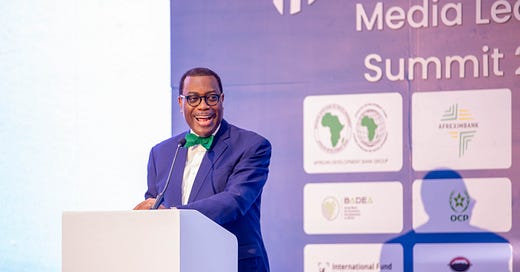AfDB Chief Urges African Media to Control Narrative
The AfDB chief urged journalists to reject perpetuating skewed perceptions and negative stereotypes that are "not reality."
NAIROBI, Kenya — The president of the African Development Bank issued an impassioned call Thursday for African media to control the continent's narrative and counter long-standing biases that deter investment and economic progress, writes Winston Mwale.
In a keynote address at the 2024 AllAfrica Media Leaders' Summit, Dr. Akinwumi Adesina chastised the prevalence of negativity in news coverage about Africa, which he said impacts "the psyche, beliefs and hopes that we have of ourselves."
"For as long as we continually think poorly of ourselves and play into the hands of those who control the narrative about us, for as long as we keep believing that that's not wrong to us, it is time for change," Adesina told the gathering of over 300 media owners, officials and others in Nairobi.
The theme of the three-day summit is "Re-engineering African Media in Times of Critical Transformation" across technology, business models and the scourge of misinformation.
Adesina argued that media narratives focused on the 0.1% of Africa's challenges rather than the 99.9% of progress fuel misconceptions that inflate risks and make capital investments three to four times costlier than in other regions.
"How many news agencies or editors have had their reporters research these biases and report on them, based on evidence of the cost of the bias?" he asked.
"There is a huge cognitive bias, and it is increasing at a critical pace, driven by digital revolution and transition from mainstream media houses to social media."
The AfDB president, whose institution maintains a triple-A credit rating, cited examples of positive African developments that he said are under-reported globally, including:
— The bank's recent $750 million bond issuance that was oversubscribed eight times by investors worldwide.
— Being ranked the best multilateral development bank globally by Global Finance magazine.
— The bank's Africa Development Fund ranking second out of 49 concessional financing institutions worldwide.
"These and other positive developments are not the kind of news Africa is known for," Adesina said.
"The news about Africa, either from within or shaped from outside, is often full of stereotypes, negativity and old and tired tropes, misconceptions, misperceptions or plain biases."
He quoted a 2021 survey that found over 80% of African journalists acknowledged their coverage reinforces stereotypes, while over a third cited advertiser disinterest in positive African stories.
Adesina contended the proliferation of misinformation further muddies narratives, noting a report that linked disinformation campaigns to destabilizing consequences in nearly 20 African nations since 2020.
"With the fragmentation of the media ecosystem, it has expanded the space for self-expression. That's good. But it has also created a new sphere of problems, including foreign interference in shaping the African narrative," he said.
The AfDB chief urged journalists to reject perpetuating skewed perceptions and negative stereotypes that are "not reality."
He recalled his late mother's advice to always commend the quality of whatever product he was selling in the market as a youth.
"I am not telling you how to write factual stories. No. Transparency. Accountability. It's important," Adesina said.
"Whenever you have, you know, when I was in secondary school, I went to a school that was in a village. And we used to go and collect water...even if there were particles at the bottom, 99.9% of our water is clean water. So, why are you focusing on the 0.1%? Why not tell the stories about 99.9%?"
He emphasized that the future of Africa's youth lies not in migrating abroad but in an Africa experiencing inclusive growth and quality of life improvements through development driven by a progressive, unbiased media industry on the continent.




